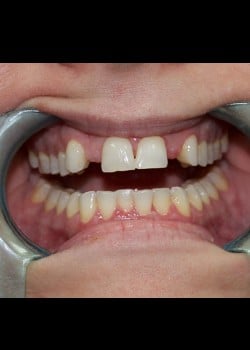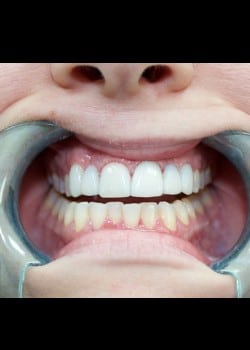What are Dentures?
A denture is a removable dental appliance and a replacement for missing teeth and surrounding tissue. They are made to closely resemble your natural teeth and may even enhance your smile.
The Main Differences Between Complete and Partial Dentures
There are two types of dentures – complete and partial dentures. Complete dentures are used when all of the teeth are missing, while partial dentures are used when some natural teeth remain. A partial denture not only fills in the spaces created by missing teeth, it prevents other teeth from shifting.
A complete denture can be either “conventional” or “immediate.” A conventional type is made after the teeth have been removed and the gum tissue has healed (usually takes 4 to 6 weeks).
During this time, the patient will go without teeth. Immediate dentures are made in advance and immediately placed after the teeth are removed, thus preventing the patient from having to be without teeth during the healing process. Once the tissues shrink and heal, adjustments will have to be made.
Dentures are very durable appliances and will last many years but may have to be remade, repaired, or readjusted due to normal wear.
Crown Before & After


Why do individuals get Dentures?
- Complete Denture – Loss of all teeth in an arch.
- Partial Denture – Loss of several teeth in an arch.
- Enhancing smile and facial tissues.
- Improving chewing, speech, and digestion.
What does getting Dentures involve?
The process of getting dentures requires several appointments, usually over a period of several weeks. Highly accurate impressions (molds) and measurements are taken and used to create your custom denture. Several “try-in” appointments may be necessary to ensure proper shape, color, and fit. At the final appointment, your dentist will precisely adjust and place the completed denture, ensuring a natural and comfortable fit.
It is normal to experience increased saliva flow, some soreness, and possible speech and chewing difficulty, however, this will subside as your muscles and tissues get used to the new dentures.
You will be given care instructions for your new dentures. Proper cleaning of your new dental appliance, good oral hygiene, and regular dental visits will aid in the life of your new dentures.
Patient Testimonial
"Hands down the best dentist I’ve ever been to. Polite and professional staff that go out of the way to provide the best service. They answered all my questions and gave me the best care possible. I was very nervous about seeing a dentist, especially since I neglected my dental care for awhile because driving all across the nation didn’t leave much time to see one, but they didn’t judge me at all. They did a cleaning and removed a tooth and now I’m on the road to a new beginning. The only regret I have is that I didn’t go sooner."
Schedule A Consultation in Ashland, OH Today!
To schedule an appointment online click here or call 419.289.1813 today!

